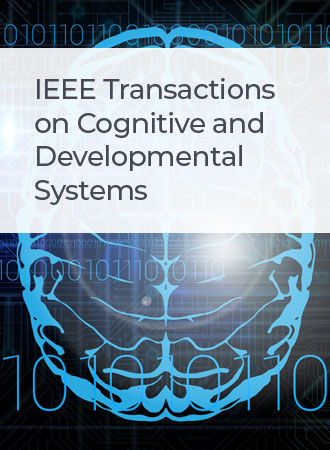MIMo:用于研究认知发展的多模式婴儿模型
IF 5
3区 计算机科学
Q1 COMPUTER SCIENCE, ARTIFICIAL INTELLIGENCE
IEEE Transactions on Cognitive and Developmental Systems
Pub Date : 2024-01-05
DOI:10.1109/TCDS.2024.3350448
引用次数: 0
摘要
人类智慧和人类意识是在认知发展过程中逐渐形成的。了解这一发展过程是理解人类思维的一个重要方面,也有助于构建具有类似特性的人工思维。重要的是,人类的认知发展依赖于与物理和社会环境的互动,而物理和社会环境是通过互补的感官模式感知的。这些互动使发展中的思维能够探究世界的因果结构。这与常见的机器学习方法(如大型语言模型)形成了鲜明对比,后者只是被动地 "消化 "大量训练数据,却无法控制其感官输入。然而,对人类智能和意识所产生的那种自我决定的具身互动进行计算建模是一项艰巨的挑战。在此,我们介绍多模态婴儿模型(MiMo),这是一个开源的多模态婴儿模型,用于通过计算机模拟研究早期认知发展。MIMo 的身体以 18 个月大的婴儿为模型,五指细致入微。MIMo 通过双目视觉、前庭系统、本体感觉和全身虚拟皮肤的触觉感知周围环境,同时通过两种不同的执行模型控制身体。我们介绍了 MIMo 的设计和界面,并举例说明了其使用方法。本文章由计算机程序翻译,如有差异,请以英文原文为准。
MIMo: A Multimodal Infant Model for Studying Cognitive Development
Human intelligence and human consciousness emerge gradually during the process of cognitive development. Understanding this development is an essential aspect of understanding the human mind and may facilitate the construction of artificial minds with similar properties. Importantly, human cognitive development relies on embodied interactions with the physical and social environment, which is perceived via complementary sensory modalities. These interactions allow the developing mind to probe the causal structure of the world. This is in stark contrast to common machine learning approaches, e.g., for large language models, which are merely passively “digesting” large amounts of training data, but are not in control of their sensory inputs. However, computational modeling of the kind of self-determined embodied interactions that lead to human intelligence and consciousness is a formidable challenge. Here, we present Multimodal Infant Model (MiMo), an open-source multimodal infant model for studying early cognitive development through computer simulations. MIMo's body is modeled after an 18-month-old child with detailed five-fingered hands. MIMo perceives its surroundings via binocular vision, a vestibular system, proprioception, and touch perception through a full-body virtual skin, while two different actuation models allow control of his body. We describe the design and interfaces of MIMo and provide examples illustrating its use.
求助全文
通过发布文献求助,成功后即可免费获取论文全文。
去求助
来源期刊

IEEE Transactions on Cognitive and Developmental Systems
Computer Science-Software
CiteScore
7.20
自引率
10.00%
发文量
170
期刊介绍:
The IEEE Transactions on Cognitive and Developmental Systems (TCDS) focuses on advances in the study of development and cognition in natural (humans, animals) and artificial (robots, agents) systems. It welcomes contributions from multiple related disciplines including cognitive systems, cognitive robotics, developmental and epigenetic robotics, autonomous and evolutionary robotics, social structures, multi-agent and artificial life systems, computational neuroscience, and developmental psychology. Articles on theoretical, computational, application-oriented, and experimental studies as well as reviews in these areas are considered.
 求助内容:
求助内容: 应助结果提醒方式:
应助结果提醒方式:


